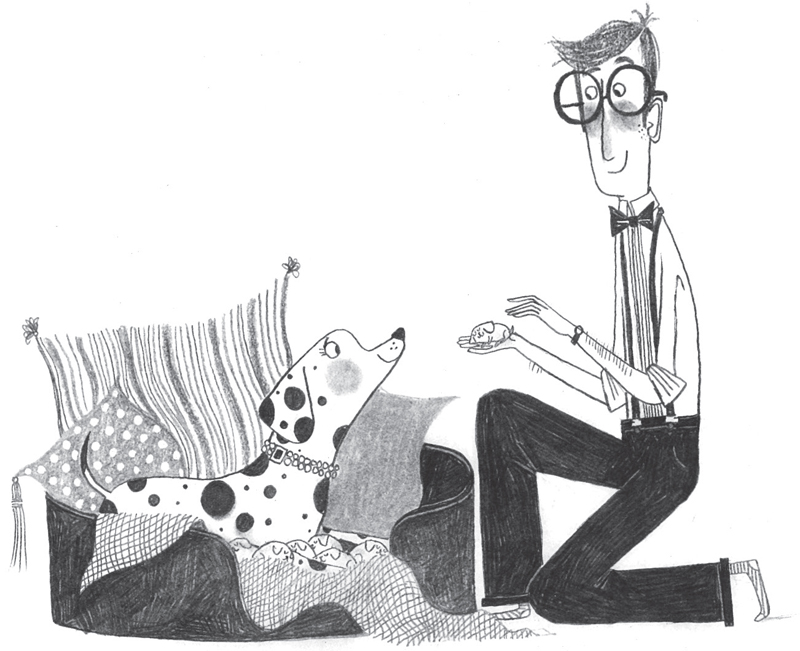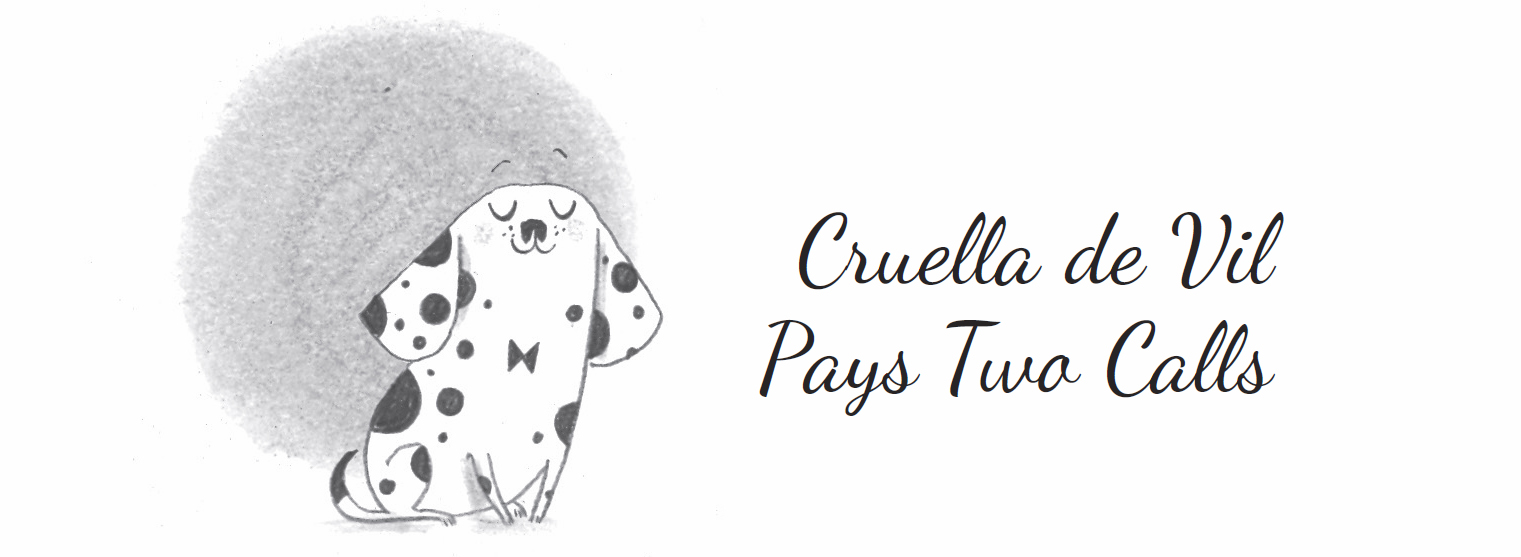
Полная версия
The Hundred and One Dalmatians Modern Classic
‘Seven or eight weeks,’ said Mr Dearly. ‘But there won’t be any for sale.’ Then he shut the cupboard door in Cruella’s face and Nanny Butler firmly showed her out of the house.
Nanny Cook was busy telephoning the Splendid Vet but he was out on another case. His wife said she would tell him as soon as he came home and there was no need to worry – it sounded as if Missis was getting on very well.
She certainly was. There was now a fourth puppy. Missis washed it and then Mr Dearly dried it, while Mrs Dearly gave Missis a drink of warm milk. Then the pup was put with the other three, in a basket placed where Missis could see it. Soon she had a fifth puppy. Then a sixth – and a seventh.
The night wore on. Eight puppies, nine puppies! Surely that would be all? Dalmatians do not often have more in their first family. Ten puppies! Eleven puppies!
Then the twelfth arrived and it did not look like its brothers and sisters. The flesh showing through its white hair was not a healthy pink but a sickly yellow. And instead of kicking its little legs, it lay quite still. The Nannies, who were sitting just outside the cupboard, told Mr and Mrs Dearly that it had been born dead.
‘But, with so many, its mother will never miss it,’ said Nanny Cook, comfortingly.
Mr Dearly held the tiny creature in the palm of his hand and looked at it sorrowfully.
‘It isn’t fair it should have no life at all,’ said Mrs Dearly, with tears in her eyes.
Something he had once read came back to Mr Dearly. He began to massage the puppy; then he tousled it gently in a towel. And suddenly there was a faint hint of pink around its nose – and then its whole little body was flushed with pink, beneath its snowy hair. Its legs moved! Its mouth opened! It was alive!

Mr Dearly quickly put it close to Missis so that she could give it some milk at once, and it stayed there, feeding, until the next puppy arrived – for arrive it did. That made thirteen!
Shortly before dawn, the front door-bell rang. It was the Splendid Vet, who had been up all night saving the life of a dog that had been run over. By then, all the puppies had been born and Missis was giving breakfast to eight of them – all she could manage at one time.
‘Excellent!’ said the Splendid Vet. ‘A really magnificent family. And how is the father bearing up?’
The Dearlys felt guilty. They had not given Pongo a thought since the puppies had begun to arrive. He had been shut up in the kitchen. All night long he had paced backwards and forwards and only once had he heard any news – when Nanny Cook had come down to make coffee and sandwiches. She had told him that Missis was doing well – but only as a joke, for she had no idea he would understand.
‘Poor Pongo, we must have him up,’ said Mrs Dearly. But the Splendid Vet said mother dogs did not usually like to have father dogs around when puppies had just been born. At that moment there was a clatter of toenails on the polished floor of the hall – and upstairs, four at a time, came Pongo. Nanny Cook had just gone down to make some tea for the Splendid Vet, and the anxious father had streaked past her the minute she opened the kitchen door.
‘Careful, Pongo!’ said the Splendid Vet. ‘She may not want you.’
But Missis was weakly thumping her tail. ‘Go down and have your breakfast and a good sleep,’ she said – but nobody except Pongo heard a sound. His eyes and his wildly wagging tail told her all he was feeling, his love for her and those eight fine pups enjoying their first breakfast. And those others, in the basket, waiting their turn – how many were there?
‘It’s a pity dogs can’t count,’ said Mrs Dearly.
But Pongo could count, perfectly. He went downstairs with his head high and a new light in his fine, dark eyes. For he knew himself to be the proud father of fifteen.

‘AND NOW,’ said the Splendid Vet to the Dearlys, ‘you must get a foster mother.’
He explained that though Missis would do her best to feed fifteen puppies, doing so would make her terribly thin and tired. And the strong puppies would get more milk than the weak ones. The puppy Mr Dearly had brought to life was very small and would need special care.
The largest pup of all had a black patch all over its ear and one side of its face. This is a bad fault in a Dalmatian – which should be born pure white, as Mr Dearly had told Cruella de Vil. Some people would have drowned this patched pup, because it would never be valuable. But the Dearlys felt particularly fond of it because it had started life with a bit of bad luck. (And they liked being able to recognise it. Until the spots started to come through, some weeks later, the big puppy with the patch and the small, delicate puppy were the only ones who could be told apart from the others.)
The Splendid Vet said the foster mother would have to be some poor dog who had lost her own puppies but still had milk to give. He thought he could get such a dog. But as he wasn’t sure, the Dearlys had better telephone all the Lost Dogs’ Homes. And until the foster mother was found, they could help Missis by feeding the pups with a doll’s feeding bottle or an old-fashioned fountain-pen filler.
Then the Splendid Vet went home for an hour’s sleep before starting his day’s work.
Nanny Cook got breakfast and Nanny Butler took Pongo for a run. And Missis was persuaded to leave her family for a few minutes’ walk. When she came back, Mrs Dearly had tidied the cupboard. Missis gave the second lot of pups a meal and then she and her family of fifteen had a glorious sleep. And Pongo, down in the kitchen, had a glorious sleep, too, knowing that all was well.
As soon as the shops opened, Mrs Dearly went out and bought a doll’s feeding bottle and a fountain-pen filler. And then Mr Dearly and the Nannies took turns at feeding puppies. Mrs Dearly fancied this job herself but was busy telephoning, trying to find a foster mother. The Nannies were too fat to be comfortable in the cupboard, so soon Mr Dearly got the feeding job all to himself and became very good at it and just a bit bossy. Of course he couldn’t go to business, which was awkward as he had an important business deal on.
Luckily there was a telephone in the Dearlys’ bedroom and it had a long cord to it. So Mr Dearly was able to telephone while he was feeding the pups. There he was, in a dark cupboard with Missis, fifteen puppies and the telephone. He nearly upset his important business deal by holding a pup to his ear and giving the telephone a drink of milk.
No sooner had Mr Dearly put the telephone down than the Splendid Vet rang up to say he had not been able to find a foster mother. Neither had Mrs Dearly, anywhere in London. She now started to ring up Lost Dogs’ Homes outside London. It was late afternoon before she heard of a mother dog with some milk to give, nearly thirty miles from London. And this dog had only just been brought in and would have to be kept some days in case she was claimed.
Mr Dearly put his head out of the cupboard. After being up all night and feeding pups all day he was beginning to feel pretty tired, but he was determined to go on helping Missis until the foster mother arrived. ‘Why not go and see if you can borrow that dog?’ he said. ‘Say we’ll give it back if its owner turns up.’
So Mrs Dearly got the car from the old stable at the back of the house and drove off hopefully. But when she got to the Dogs’ Home she found that the mother dog had already been claimed. She was glad for the dog’s sake, but terribly disappointed. She thought of poor Missis getting exhausted by too many puppies, and of Mr Dearly, who might easily refuse to come out of the cupboard for a good night’s sleep, and she began to think she never would find a foster mother.
It was now almost dark, a gloomy, wet October evening. It had been raining all afternoon, but Mrs Dearly hadn’t minded when she was feeling hopeful. Now, as she started back for London, the weather made her feel more and more depressed. And the rain got so heavy that the windscreen wiper could hardly keep pace with it.
She was driving across a lonely stretch of common when she saw what looked like a bundle lying in the road ahead of her. She slowed down and as she drew closer she saw that it was not a bundle but a dog. Instantly, she thought it must have been run over. Dreading what she might find, she stopped the car and got out.
At first she thought the dog was dead, but as she bent down it struggled to its feet showing no signs of injury. It was so plastered with mud that she could not see what kind of dog it was. What she could see, by the light from the car’s headlights, was the poor creature’s pitiful thinness. She spoke to it gently. Its drooping tail gave a feeble flick, then dropped again.

‘I can’t leave it here,’ thought Mrs Dearly. ‘Even if it hasn’t been run over, it must be near starvation. Oh, dear!’ With seventeen dogs at home already she had no wish to take back a stray, but she knew she would never bring herself just to hand this poor thing in at a police station.
She patted it and tried to get it to follow her. It was willing to, but its legs were so wobbly that she picked it up and carried it. It felt like a sack of bones. And, as she noticed this, she also noticed something else. Hurriedly, she laid the dog on the seat of the car, on a rug, and turned on the light. Then she saw that this was a mother dog and that in spite of its starving condition it still had some milk to give.
She sprang into the car and drove as fast as she safely could. Quite soon she was in the London suburbs. She knew it would still take her some time to get home, because of the traffic, so she stopped at a little restaurant. Here the owner let her buy some milk and some cold meat and lent her his own dog’s dishes. The starving dog ate and drank ravenously, then at once settled to sleep. The nice owner of the restaurant took back his dishes and wished Mrs Dearly luck as she drove away.
She got home just as the Splendid Vet was arriving to see Missis and the puppies. He carried the stray dog in and down to the warm kitchen. After a careful examination he said he thought her thinness was due more to having had puppies than to long starvation and that, if she was fed well, the milk intended for her own puppies might continue. He guessed they had been taken away from her and she had got lost looking for them.
‘She ought to have a bath,’ said Nanny Cook, ‘or she’ll give our puppies fleas.’
The Splendid Vet said a bath was a good idea, so the dog was carried into a little room which had been fitted up as a laundry. Nanny Cook got on with the bath as fast as she could because she was afraid Mr Dearly might want to do the job himself. Mrs Dearly had gone upstairs to tell him what was happening.
The stray seemed delighted with the warm water. She had just been covered with soap when Pongo came back from a walk with Nanny Butler and ran through the open door of the laundry.
‘He won’t hurt a lady,’ said the Splendid Vet.
‘I should hope not, when she’s going to help nurse his puppies,’ said Nanny Cook.
Pongo stood on his hind legs and kissed the wet dog on the nose, telling her how glad he was to see her and how grateful his wife would be. (But no human heard him.) The stray said: ‘Well, I’ll do my best, but I can’t promise anything.’ (No human heard that, either.)
Just then Mr Dearly came hurrying in, to see the new arrival.
‘What kind of a dog is she?’ he asked.
At that moment, Nanny Cook began to rinse off the soap – and everyone gave a gasp. This dog was a Dalmatian, too! But her spots, instead of being black, were brown – which in Dalmatians is called not ‘brown’ but ‘liver’.
‘Eighteen Dalmatians under one roof,’ said Mr Dearly, gloatingly. ‘Couldn’t be better.’ (But it could, as he was one day to learn.)
Wet, the poor liver-spotted dog looked thinner than ever.
‘We’ll call her Perdita,’ said Mrs Dearly, and explained to the Nannies that this was after a character in Shakespeare. ‘She was lost. And the Latin word for lost is “perditus”.’ Then she patted Pongo, who was looking particularly intelligent, and said anyone would think he understood. And indeed he did. For though he had very little Latin beyond ‘Cave canem’, he had, as a young dog, devoured Shakespeare (in a tasty leather binding).
Perdita was dried in front of the kitchen fire and given another meal. The Splendid Vet said she ought to start mothering puppies as soon as possible to encourage her to provide more milk, so after she was quite dry and had taken a nap, two puppies were removed from the cupboard while Missis went out for a little air. The Splendid Vet said she would not know they had gone – which is possible, as she could not count as well as Pongo could. But she knew all about those puppies going because Pongo had told her and she had sent polite messages to Perdita. Missis felt a bit unhappy about giving any puppies up but she knew it was for their good.
Before leaving, the Splendid Vet warned the Dearlys that if Perdita could not feed the puppies they must not be returned to Missis, for her sense of smell would tell her that they had been with some other dog and she might turn against them. And this does happen with some dogs. It would never have happened with Missis, but it will already have been seen that she and Pongo were rather unusual dogs. And so was Perdita. And so, if people only realised it, are many dogs. In fact, usual dogs are really more unusual than unusual dogs.
Anyway, Perdita was able to feed the two puppies. Pongo went upstairs and told Missis so (though to the Dearlys it only sounded like the thumping of his tail). Then he said goodnight and went back to the kitchen, where his basket was ready for him. Perdita had the basket Missis usually slept in. She had fed and washed the two puppies and was now having a light supper. (The Splendid Vet had said she must eat all she possibly could, to get her strength back.) Pongo had a snack himself, to encourage her. Then the Nannies went to bed and the kitchen was left in darkness except for the glow from the fire. And, when the two puppies were asleep, Perdita told Pongo her story.
She had been born in a large country house, not far from the common where Mrs Dearly had found her. Although very pretty, she had been less valuable than her brothers and sisters; her spots were rather small and her tail inclined to curl (it had straightened as she grew older). As no one rich or important wanted to be her pet, she was given to a farmer, who, though not cruel to her, never gave her the love all Dalmatians need. And he let her run wild, which is not good for any kind of dog.
A time came when she felt a great desire to marry. But no marriage was arranged for her and, as the farm was over a mile from any village, no dog had come courting her. So, one day, she set out to find a husband for herself.
Her way to the village lay across the common, where she saw a large, handsome car, which had been driven on to the grass. A group of people were having a picnic – and with them was a superb liver-spotted Dalmatian. Now, liver-spotted Dalmatians are unusual. Perdita had been the only one in her family, and always thought herself a freak. She instantly knew that the dog on the common was no freak but a most valuable animal, for he wore a magnificent collar and was being offered a piece of chicken by a richly dressed lady. At that moment, he saw Perdita.
It was love at first sight. Without even bothering to eat the chicken, he came bounding to her and they were away into a wood together before anyone could stop them. Here they made swift arrangements for their marriage, promising to love each other always. Then the happy husband told his wife she must, of course, come and live with him, and led her back to the common. But, as they reached it, along came the farmer Perdita lived with, in his rattling old car. He dragged her into it – and the picnic party bundled her husband into their car. Both dogs struggled and howled but it was useless. The cars drove off in opposite directions.
Nine weeks after her marriage, Perdita had eight puppies. The farmer did not give her extra food, or help to feed the puppies himself so she got thinner and thinner; by the time her family was a month old, she was just skin and bone. Then the farmer put down some food for the puppies to eat and they quickly learnt how to, but they still went on taking all the milk Perdita could give them, so she never had a chance to regain her weight. She was such a very young mother, barely full-grown herself, but she loved her babies dearly and did all she could for them. And as she got thinner they got fatter.
The spots on Dalmatians begin to come through after two weeks. By the time Perdita’s family were six weeks old it was obvious that they were going to be beautifully marked and very valuable – Perdita heard the farmer say so, to a stranger who came to the farm one morning. She was still helping to feed them; they would eat all the farmer offered and then come to her for milk. Then she and they would all have a happy sleep in the old box she had been given for a bed.
One afternoon, she woke to find not one puppy in bed with her. She searched the farmhouse, she searched the farmyard. No puppies anywhere. She ran on to the road, fearing they might have been run over. On and on she went, pausing every few minutes to bark. No answering puppy-bark came to her. Soon it began to rain. She thought of the puppies all getting wet, and barked more and more desperately. A car nearly ran over her; she only saved herself by jumping into a muddy ditch, where the mud even got into her eyes and ears. By the time she reached the common where she had met her husband, she was shivering and weak on her legs. The thought of her lost husband added to her misery at the loss of the puppies. She had eaten nothing since the previous afternoon – the farmer only gave her one meal a day. At last, faint with hunger and utterly broken-spirited, she collapsed. And there, not long after, Mrs Dearly found her.
That was Perdita’s whole story; except that she never told Pongo that the farmer had named her ‘Spotty’ – because she liked ‘Perdita’ so much better.
Pongo sympathised with all his heart and did his best to comfort her. He said he did not think the puppies were lost. It was more likely that they had been sold – perhaps to the stranger who came to see them. And this might be the best thing that could have happened to them – for if they were valuable they were sure to be well taken care of. There would never have been enough food at the farm for them when they got really big. Perdita knew all this was true. And the two tiny puppies in the basket with her were wonderfully comforting – so were the kind things Pongo said about being grateful to her for feeding them. Soon she felt much happier and slid into a warm, well-fed sleep.
Pongo lay awake for a long time, wishing Missis and all the puppies could have been with him in the firelit kitchen. He strolled over and looked at the two puppies asleep with Perdita, and felt proud and protective – and extremely sorry for Perdita. Really, she was a very pretty girl – if not a patch on his Missis.
Then he went back to his basket, had a last wash, and settled down. The fire sank lower; soon the kitchen was lit only by a faint light from a street lamp on the Outer Circle. Pongo slept. Perdita slept. And the two puppies, who had come successfully through their first day in the world, slept as peacefully as if they had been with their own mother.
Up in the cupboard, Missis had just served supper for eight and was a trifle tired. Mr Dearly had just served supper for five and was so exhausted by his day of puppy-feeding that he had to crawl out of the cupboard on his hands and knees. Mrs Dearly got him to bed and fed him with hot milk from a Thermos. They slept with their door open, in case Missis needed anything, but she was very peaceful – though just before she fell asleep she did wonder a little about the strange female down in the kitchen with Pongo. She didn’t worry, exactly; she just wondered.
On the top floor, Nanny Cook slept dreaming of Dalmatian puppies dressed as babies, and Nanny Butler slept dreaming of babies dressed as Dalmatian puppies.
What with four humans, three dogs and fifteen puppies, it really was a very sleep-full house.

THE NEXT DAY, five more puppies were brought down to Perdita and she fed them splendidly. So Mr Dearly went to his business. He hurried back early to do some pup-feeding and found that Mrs Dearly was feeding the upstairs puppies and the Nannies were taking it in turns to feed the kitchen puppies. He was a little jealous but soon got over it – for he knew that what really mattered was that pups should get plenty of milk without exhausting Missis and poor, thin Perdita too much.
Perdita now had her bed in the dresser cupboard where there would not be too much light for the puppies’ eyes. These began to open in eight days. And a week after that the puppies’ spots began to show.
What a day it was when Mr Dearly sighted the first spot! After that, spots came thick and fast, though they would not all be through for some months. In a very few days it was possible to recognise every pup by its spots. There were seven girls and eight boys. The prettiest of all the girls was the tiny pup whose life Mr Dearly had saved at birth, but she was very small and delicate. When pigs have families, the smallest, weakest piglet is often called the cadpig. Mr Dearly always called the tiny puppy ‘Cadpig’, which can be a nice little name when spoken with love.
Patch, the pup born with a black ear, was still the biggest and strongest puppy. He always seemed to be next to the Cadpig, as if these two already knew they were going to be special friends. There was a fat, funny, boy-puppy called Roly Poly, who was always getting into mischief. And the most striking pup of all was one who had a perfect horse-shoe of spots on his back – and had therefore been named ‘Lucky’. He was terrifically energetic and showed from the beginning that he was going to be the ring-leader of all his brothers and sisters.
A few days after the first spots came through, something very upsetting happened: Perdita’s milk supply failed. She was miserable about it because she loved the seven pups she had been feeding as much as if they were her own. And she was very, very frightened. Now that she was no longer useful, why should the Dearlys keep her in this warm, comfortable house where – for the first time in her life – she had been given enough to eat? But it was not the food and warmth that mattered most to her. It was the love. She had been treated as one of the family. The thought of leaving it all was more than she could bear.
And what happened to dogs nobody wanted? All sorts of fears awoke in her heart.
The morning she found she had no milk to offer at all, she crept unhappily out of the dresser cupboard and saw Mrs Dearly having a midmorning cup of tea with the Nannies. Mrs Dearly held out a biscuit. Perdita did not take it. She just laid her head against Mrs Dearly’s knee and gave a little moan.
Mrs Dearly stroked her and said: ‘Poor Perdita! I wish we could explain to her that we are helping to feed her seven puppies, so she doesn’t need to worry. Darling Perdita, you are washing them beautifully and keeping them warm at night. We couldn’t possibly do without you.’
She had no hope of being understood; she just thought her soothing tone would be comforting. But Perdita was picking up more and more human words every day and understood perfectly. She was wild with relief. For the first time, she showed really high spirits, jumping up and kissing Mrs Dearly, then dashing back to wash the puppies all over again.

